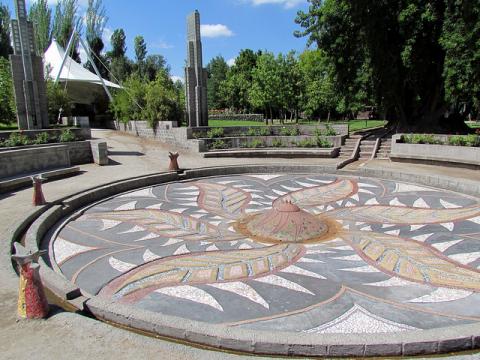
On September 11, we remember the terrible events that occurred in New York, Pennsylvania and at the Pentagon in 2001, and we pray for all those who still suffer the reprecussions from that day.
For many Maryknollers and others who have worked for justice, September 11 was the date of another tremendous tragedy: the 1973 coup against Chile's democratically-elected president Salvador Allende, which ushered in the repressive dictatorship of Gen. Augusto Pinochet.
On this 40th anniversary of the coup in Chile, Maryknoll Fr. Paul Masson reflects: "I was in the Maryknoll Center House in Santiago [that day in 1973] ... Our house rocked when they bombed President Salvador Allende’s house. Salvador Allende was a democratically elected president, a decision of the voters and the Chilean Congress. This decision was not respected by [the U.S.] government, which put economic interests before democratic principles.
"In the first months after the coup, many men and women were arrested, tortured and murdered. The military government continued for over 16 years.
"One lesson that I have learned is that we cannot solve our problems with violence."
Sam Stanton, executive director of the Maryknoll lay missioners, who served in Chile and whose family is Chilean, writes: "[Today], the Chilean people still deal with the wounds of that dark period of Chilean history. Recently, a Chilean television channel has aired a program of interviews about the atrocities suffered by thousands and the impact it had on their families. It apparently has caused quite a stir in many people, especially the younger generations that have been born since the dictatorship ended in 1990 (plebiscite in 1988 – elections in 1990).
"As I contemplate this 'anniversary' there are so many people that come to mind, both victims and heroes. I think of a good friend Purisima Lopez (name changed). Her father and brother were pulled from their rural farm house early one morning a few days after the coup, never to be seen again. Puri and her mother spent years searching and investigating but to no end. Puri’s mother died a few years ago, a courageous but sad soul, never having a grave where to say an Ave or where to place flowers.
"On the hero side, many come to mind but today I particularly think of our old bishop of Linares, Don Carlos Camus. He is frail and nearing 90 but what a valiant and faith filled man who constantly defended the victims of human rights abuses despite threats to his own life and expulsion from the country.
"Many are the memories [on September 11] but as we remember let us pray that we can grow in conviction to justice and peace in our own U.S. society and especially in the many points of conflict and injustice around the world.
"As we say in Chile: nunca mas, never again."
On September 9, Democracy Now! aired an interview with Joan Jara, the widow of singer Victor Jara, who was one of the thousands of people tortured and killed in the weeks after the coup. The Jara family "has filed a civil lawsuit in U.S. court against the former military officer who allegedly killed Jara 40 years ago. Jara’s accused killer, Pedro Barrientos, has lived in the United States for roughly two decades and is now a U.S. citizen. Jara’s family is suing him under federal laws that allow U.S. courts to hear about human rights abuses committed abroad." Listen to the interview here.
For years, the Institute for Policy Studies (IPS) has given the Letelier-Moffitt human rights award, named for Orlando Letelier, a former Chilean diplomat and director of IPS's Transnational Institute, and Ronni Karpen Moffitt, an IPS development associate; they were killed in 1976 by a car bomb placed by agents of Pinochet's regime. The award is given to honor these fallen colleagues while celebrating new heroes of the human rights movement from the United States and the Americas. (The Maryknoll Sisters were given the award in 1981.)
In 2012, one of the awardees was the Chilean Students Movement (Confederación de Estudiantes Chilenos); read the Confederación's president Camila Vallejo's moving Letelier-Moffitt acceptance speech.
Learn more about Camila Vallejo and the Chilean Students Movement in this article from the January-February 2012 NewsNotes: Chile: Students push education reform
"By neoliberal standards Chile is one of South America's most economically stable and prosperous countries. It has been the poster child of neoliberal economic reform since the days of President Augusto Pinochet, and, in 2010, became the first South American country invited into the Organization of Economic Cooperation and Development (OECD). Despite garnering this international recognition, behind the facade it continues to produce some of the worst social indicators of any developed country: It has the highest income inequality among OECD countries, with 5.3 percent of the population living on $2 a day. Chile's education system—one of the most segregated and privatized in the world, with 55 percent of secondary students attending private schools, and with one of the lowest levels of public funding for education—contributes to this inequality. During the height of the student-led Penguins' Revolution in 2006, nearly 800,000 students participated in strikes and marches for reform. In May [2011], the student movement was resurrected, and the Chilean education system has once again been thrust into the international spotlight by the outbreak of massive student strikes and protests. ..."
Photo by David Berkowitz of the peace park at Villa Grimaldi; the house in Santiago was the site of torture and death in the weeks after the coup. It has been transformed into a memorial for the victims.
